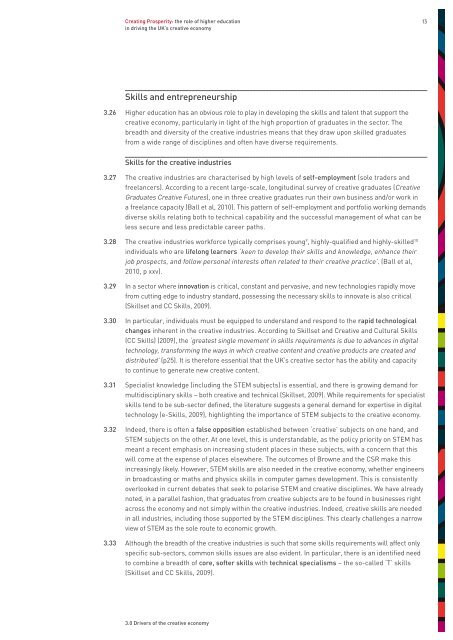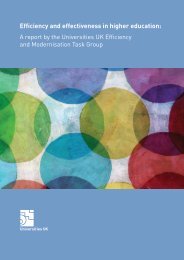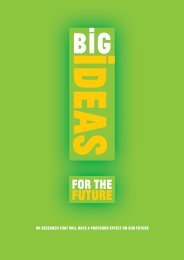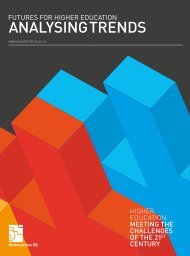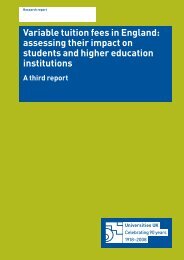Creating Prosperity: the role of higher education in ... - Universities UK
Creating Prosperity: the role of higher education in ... - Universities UK
Creating Prosperity: the role of higher education in ... - Universities UK
Create successful ePaper yourself
Turn your PDF publications into a flip-book with our unique Google optimized e-Paper software.
<strong>Creat<strong>in</strong>g</strong> <strong>Prosperity</strong>: <strong>the</strong> <strong>role</strong> <strong>of</strong> <strong>higher</strong> <strong>education</strong><strong>in</strong> driv<strong>in</strong>g <strong>the</strong> <strong>UK</strong>’s creative economy13Skills and entrepreneurship3.26 Higher <strong>education</strong> has an obvious <strong>role</strong> to play <strong>in</strong> develop<strong>in</strong>g <strong>the</strong> skills and talent that support <strong>the</strong>creative economy, particularly <strong>in</strong> light <strong>of</strong> <strong>the</strong> high proportion <strong>of</strong> graduates <strong>in</strong> <strong>the</strong> sector. Thebreadth and diversity <strong>of</strong> <strong>the</strong> creative <strong>in</strong>dustries means that <strong>the</strong>y draw upon skilled graduatesfrom a wide range <strong>of</strong> discipl<strong>in</strong>es and <strong>of</strong>ten have diverse requirements.Skills for <strong>the</strong> creative <strong>in</strong>dustries3.27 The creative <strong>in</strong>dustries are characterised by high levels <strong>of</strong> self-employment (sole traders andfreelancers). Accord<strong>in</strong>g to a recent large-scale, longitud<strong>in</strong>al survey <strong>of</strong> creative graduates (CreativeGraduates Creative Futures), one <strong>in</strong> three creative graduates run <strong>the</strong>ir own bus<strong>in</strong>ess and/or work <strong>in</strong>a freelance capacity (Ball et al, 2010). This pattern <strong>of</strong> self-employment and portfolio work<strong>in</strong>g demandsdiverse skills relat<strong>in</strong>g both to technical capability and <strong>the</strong> successful management <strong>of</strong> what can beless secure and less predictable career paths.3.28 The creative <strong>in</strong>dustries workforce typically comprises young 9 , highly-qualified and highly-skilled 10<strong>in</strong>dividuals who are lifelong learners ‘keen to develop <strong>the</strong>ir skills and knowledge, enhance <strong>the</strong>irjob prospects, and follow personal <strong>in</strong>terests <strong>of</strong>ten related to <strong>the</strong>ir creative practice’. (Ball et al,2010, p xxv).3.29 In a sector where <strong>in</strong>novation is critical, constant and pervasive, and new technologies rapidly movefrom cutt<strong>in</strong>g edge to <strong>in</strong>dustry standard, possess<strong>in</strong>g <strong>the</strong> necessary skills to <strong>in</strong>novate is also critical(Skillset and CC Skills, 2009).3.30 In particular, <strong>in</strong>dividuals must be equipped to understand and respond to <strong>the</strong> rapid technologicalchanges <strong>in</strong>herent <strong>in</strong> <strong>the</strong> creative <strong>in</strong>dustries. Accord<strong>in</strong>g to Skillset and Creative and Cultural Skills(CC Skills) (2009), <strong>the</strong> ‘greatest s<strong>in</strong>gle movement <strong>in</strong> skills requirements is due to advances <strong>in</strong> digitaltechnology, transform<strong>in</strong>g <strong>the</strong> ways <strong>in</strong> which creative content and creative products are created anddistributed’ (p25). It is <strong>the</strong>refore essential that <strong>the</strong> <strong>UK</strong>’s creative sector has <strong>the</strong> ability and capacityto cont<strong>in</strong>ue to generate new creative content.3.31 Specialist knowledge (<strong>in</strong>clud<strong>in</strong>g <strong>the</strong> STEM subjects) is essential, and <strong>the</strong>re is grow<strong>in</strong>g demand formultidiscipl<strong>in</strong>ary skills – both creative and technical (Skillset, 2009). While requirements for specialistskills tend to be sub-sector def<strong>in</strong>ed, <strong>the</strong> literature suggests a general demand for expertise <strong>in</strong> digitaltechnology (e-Skills, 2009), highlight<strong>in</strong>g <strong>the</strong> importance <strong>of</strong> STEM subjects to <strong>the</strong> creative economy.3.32 Indeed, <strong>the</strong>re is <strong>of</strong>ten a false opposition established between ‘creative’ subjects on one hand, andSTEM subjects on <strong>the</strong> o<strong>the</strong>r. At one level, this is understandable, as <strong>the</strong> policy priority on STEM hasmeant a recent emphasis on <strong>in</strong>creas<strong>in</strong>g student places <strong>in</strong> <strong>the</strong>se subjects, with a concern that thiswill come at <strong>the</strong> expense <strong>of</strong> places elsewhere. The outcomes <strong>of</strong> Browne and <strong>the</strong> CSR make this<strong>in</strong>creas<strong>in</strong>gly likely. However, STEM skills are also needed <strong>in</strong> <strong>the</strong> creative economy, whe<strong>the</strong>r eng<strong>in</strong>eers<strong>in</strong> broadcast<strong>in</strong>g or maths and physics skills <strong>in</strong> computer games development. This is consistentlyoverlooked <strong>in</strong> current debates that seek to polarise STEM and creative discipl<strong>in</strong>es. We have alreadynoted, <strong>in</strong> a parallel fashion, that graduates from creative subjects are to be found <strong>in</strong> bus<strong>in</strong>esses rightacross <strong>the</strong> economy and not simply with<strong>in</strong> <strong>the</strong> creative <strong>in</strong>dustries. Indeed, creative skills are needed<strong>in</strong> all <strong>in</strong>dustries, <strong>in</strong>clud<strong>in</strong>g those supported by <strong>the</strong> STEM discipl<strong>in</strong>es. This clearly challenges a narrowview <strong>of</strong> STEM as <strong>the</strong> sole route to economic growth.3.33 Although <strong>the</strong> breadth <strong>of</strong> <strong>the</strong> creative <strong>in</strong>dustries is such that some skills requirements will affect onlyspecific sub-sectors, common skills issues are also evident. In particular, <strong>the</strong>re is an identified needto comb<strong>in</strong>e a breadth <strong>of</strong> core, s<strong>of</strong>ter skills with technical specialisms – <strong>the</strong> so-called ‘T’ skills(Skillset and CC Skills, 2009).3.0 Drivers <strong>of</strong> <strong>the</strong> creative economy


